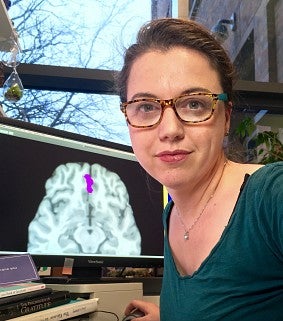Faculty bio | Research webpage
Biography:
Christina Karns is an academic expert in brain development, self-regulation and gratitude. She serves as director of the Emotions and Neuroplasticity Project and a researcher in the Center for Brain Injury Research and Training. She uses human neuroimaging, behavior and assessments to address how positive emotions interact with values to support well-being. Her research also addresses fundamental neuroplasticity questions such as: How does the interaction of the brain with autonomic systems supports emotion and cognition over the lifespan? How does experience affect the development of self-regulation, attention and sensation in children, teens and adults? This work provides a foundation for evidence-based interventions that use the neuroplasticity of emotions and cognition to support healthy development across the lifespan and to support recovery following brain injury.
Recent Media:
- RESEARCH: When you’re grateful, your brain becomes more charitable (Being Patient, Nov. 22, 2024)
- The health benefits of gratitude (WJCT News, NPR, Jacksonville Beach, FL, Nov. 26, 2022)
- First, an Open Hand (Lion's Roar, March 15, 2022)
- Giving thanks may make your brain more altruistic (Vox, Nov. 27, 2019)
- Practicing gratitude can have a huge impact on your well-being (The Epoch Times, Oct. 18, 2019)
- Can you train your brain to be more grateful? New research says yes (Phoenix Public Radio, Dec. 17, 2018)
- When you’re grateful, your brain becomes more charitable (The Conversation, Nov. 21, 2018)
- Why gratitude journals are good for everyone (South Dakota Public Radio, Jan. 22, 2018)
- Writing a daily diary can literally change your brain (World Economic Forum, Jan. 18, 2020)
- Writing on gratitude changes how the brain values charity (OregonNews, Jan. 2, 2018)
- A Grateful Heart, a Giving Mind (Oregon Quarterly, winter 2018)
- Want a more altruistic brain? Try daily gratitude journaling (Psychology Today, Dec. 18, 2017)


